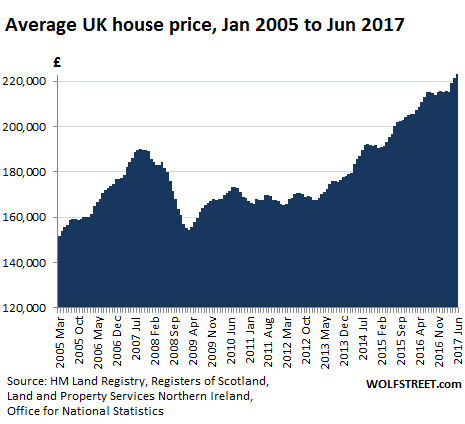
The average capacity factor at 28 operating UK offshore wind farms is 33.6% (most recent 12-month average) and 34.5% (lifetime), increasing to 36.1% and 37.5% when four demonstration projects are discarded. There is a dependence of capacity factor on age, with older farms showing capacity factors of around 30% and younger ones factors of around 40%. This is interpreted to be a result of increased turbine sizes, with taller modern turbines accessing higher wind speeds at higher elevations. There is no evidence for significant degradation of turbine performance with time. A “generic” UK offshore wind farm coming on line in 2017 can be assumed to have a capacity factor of around 41%, although projections indicate that the turbines planned for the Hornsea II farm discussed in previous posts could have capacity factors exceeding 60%.
The data used in this post are from Energy Numbers. I have no way of verifying these data but have assumed them to be correct.
Two recent posts that attracted considerable interest, one by Euan Mearns and one by me, addressed the subject of UK offshore wind strike prices, and since strike prices are directly related to capacity factor I thought this would be an appropriate time to look into the question of what UK offshore wind farm capacity factors have been, what they are now, what we might expect them to be in the future, and in particular what are the factors that govern what the capacity factor is likely to be.
The locations of the 24 offshore wind farms used in the analysis are shown by the red boxes in Figure 1 (the four demonstration projects listed by Energy Numbers bias capacity factors low and are excluded). Ten are on the west coast of the UK and fourteen on the east. Most are close inshore. The map and the accompanying explanation are from this July 2015 UK government publication.
…click on the above link to read the rest of the article…








 In this week’s Blowout we return to Brexit and its impacts. It is now reported that following Brexit the UK will “scale down its concern over climate change” and scrap the EU’s 15%-of-total-energy-from-renewables-by-2020 target. Can outright repeal of the 2008 Climate Change Act be far behind?
In this week’s Blowout we return to Brexit and its impacts. It is now reported that following Brexit the UK will “scale down its concern over climate change” and scrap the EU’s 15%-of-total-energy-from-renewables-by-2020 target. Can outright repeal of the 2008 Climate Change Act be far behind?



